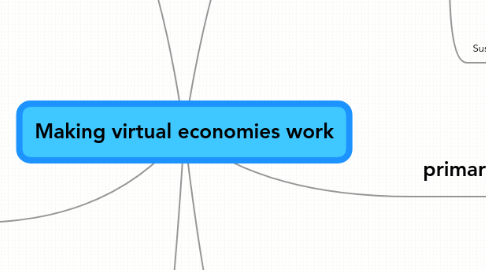
1. merchandising
1.1. Susan Choe
1.1.1. essentially a retail business + entertainment
1.1.2. events, social interaction drives retention!
1.1.3. need to do number crunching
1.1.3.1. sales, traffic, demographics
1.1.3.2. buy what, how, when
1.1.3.3. identify what sells -> try to bring this up in the game at the right for the right players
1.1.4. C2C market
1.1.4.1. needs escrow -> leads to money holding & banking regulations
1.1.4.1.1. scary stuff
1.1.4.1.2. better to outsource it
1.2. Christopher Donahue
1.2.1. acquired Sony's Station Exchange, increased their revenues a lot
1.2.1.1. now at 50-60 $ / transaction
1.2.1.2. also volume of transactions has grown
1.2.2. if you don't have a secondary market, somebody will build it if there's money to be made
1.2.3. if you have a secondary market when you go out, there is less hesistancy from the users as they accept it from the get go
1.2.4. secondary market is a profit center, if it is publisher-sanctioned
1.2.4.1. black market just creates support costs, bad image for the publisher etc
1.2.5. Inventory control
1.2.5.1. metrics & control on what's going on the economy
1.2.5.2. data from secondary market helps in managing primary market
2. fees
2.1. Christian Debaun
2.1.1. 10% fee for secondary market
2.1.1.1. profit share with publisher
2.1.2. primary more expensive
2.1.3. light integration
2.1.3.1. e.g. verifying from the item DB what the seller owns
2.2. Christopher Donahue
2.2.1. 10% fee for secondary market
2.2.1.1. profit share with publisher
2.3. Lee Crawford
2.3.1. 10% fee
2.4. operating margins
2.4.1. you could perhaps apply standard retail rules of thumbs for this
3. Q&A
3.1. pricing strategy
3.1.1. test price points, collect data, tweak it (5%, 10%, even 20-30%), see what happens
3.1.2. do market research
3.1.2.1. what other games sell, when, how
3.1.2.2. then test these hypotheses
3.1.2.3. look at black & grey markets to see what's the going rates / elasticity
3.1.3. test with sample of users, try to measure price elasticity
3.1.4. "socioeconomic stats"
3.1.4.1. sample = 100 users -> if you get a trend, then it is typically right
3.1.5. don't forget ROI
3.1.5.1. see what ARPU you need, and how you get to that
3.1.5.2. cost of development of content
3.1.5.3. marketing costs
3.1.6. spray & pray doesn't work
3.2. seeding economy
3.2.1. who gets free credits etc
3.2.2. Susan Choe
3.2.2.1. if users get used to free stuff, it is really hard to get them to pay
3.2.2.1.1. don't start that way
3.2.2.2. you can do real world sweepstakes
3.2.2.2.1. e.g. 40" HDTV
3.2.3. Susan Wu
3.2.3.1. give it out for behaviour you want to encourage
3.2.4. Lee Crawford
3.2.4.1. give out soft currency, not the hard currency
3.2.4.2. does somewhat cannibalize hard currency sales, but you can always tweak soft currency "give out" rates
3.2.5. Christian Debaun
3.2.5.1. if you give out free currency, people will game it
3.2.5.1.1. blows up your economy
4. Panelists
4.1. Susan Choe, Outspark
4.1.1. CEO & Founder
4.1.2. online game publisher
4.1.3. "virtual fairground"
4.1.3.1. each game = 1 ride
4.1.3.2. main street coming soon
4.1.3.2.1. linking games together
4.1.4. 5 games
4.1.4.1. 1 flash Items-based game
4.1.5. >3 M registered users, >2 M monthly uniques,75% from USA
4.1.5.1. 16-25 year olds
4.2. Lee Crawford, Twofish
4.2.1. Founder & CEO
4.2.2. ERP for Virtual Worlds & online entertainment
4.2.2.1. banking, reporting, inventory management
4.2.2.2. horizontal white label platform
4.3. Christopher Donahue, LiveGamer
4.3.1. publisher-sanctioned primary and secondary market vgoods transactions
4.3.1.1. B2C and C2C
4.4. Christian DeBaun, PlaySpan
4.4.1. VP of Operations
4.4.2. publisher-sanctioned primary and secondary market vgoods transactions
4.4.3. recently bought PayByCash
4.4.4. revenue-share model with game publisher
4.5. Susan Wu, Ohau
4.5.1. former VC at Charles River Ventures
5. primary vs. secondary
5.1. Susan Choe
5.1.1. nothing outsourced in primary market (B2C)
5.1.1.1. built this themselves because nothing was available when they were starting 2 years ago
5.1.2. signed PlaySpan for secondary market (?)
5.1.3. probably need couple of hundred thousand $ of volume in primary market before secondary market takes of
5.1.3.1. also look at the game: once players start setting up stores themselves, time to open up the secondary market officially
5.2. Christian DeBaun
5.2.1. secondary market needs to exist to promote primary market
5.2.1.1. makes market liquid for players
5.2.1.1.1. Susan Choe supported this view
5.2.1.2. separating primary & secondary is artificial
5.2.1.2.1. it's a interconnected economy, and you need to consider the whole
5.2.2. think secondary market should take place outside of the game
5.3. Christopher Donahue
5.3.1. time & cost of implementation of secondary market?
5.3.1.1. regulatory costs (e.g. different state taxes, international laws)
5.3.1.2. try not to be a "money holder" so you won't become regulated
5.3.1.2.1. these platform providers take care of this (?)
5.4. Lee Crawford
5.4.1. secondary market allows users to trade money to time and vica versa
6. metrics, tools
6.1. Lee Crawford
6.1.1. what are the key performance indicators
6.1.1.1. first optimize your user experience
6.1.1.1.1. get the free to play part working, understand the friction between selling items & gameplay, what can you sell etc
6.1.1.2. then you can optimize your catalog
6.1.1.3. need real-time access to data
6.2. Susan Choe
6.2.1. needs tools to spot fraud
6.2.1.1. e.g. limits on dollar amounts per user/demographics
6.2.1.2. had challenges with in getting this done with PayPal
6.2.1.3. fraud becomes noticeable with increased volume and non-USA geography
6.2.2. have a PhD just doing analytics
6.2.3. track data
6.2.3.1. marketing source
6.2.3.2. funnels
6.2.3.3. new users, what they buy, how they buy, engagement etc
6.2.3.4. lifetime value
6.2.3.5. in-game stats & web stats
6.2.4. qualititative data
6.2.4.1. surveys
6.2.4.2. focus groups
